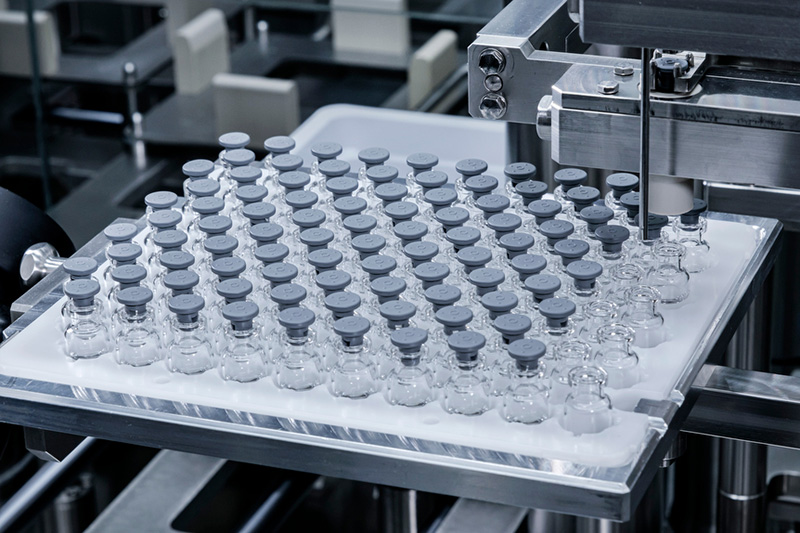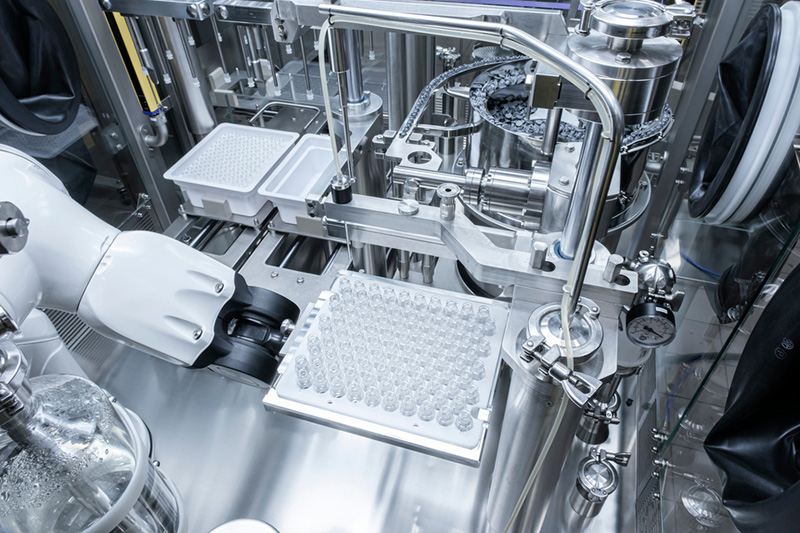Steriline and Shilpa Medicare, one of the largest specialty generic pharmaceutical companies in the world, based in India, recently developed a cutting-edge filling, stoppering and capping solution for injectable oncology products. The two companies have been working together for more than 10 years, signing their first collaboration when they were both emerging realities with expansion strategies, and they have been growing together since then.
Shilpa Medicare’s request was for a new pilot line, with extremely small footprint, to process vials, pre-filled syringes (PFS) and cartridges for injectable oncology drugs, which could work with very limited human intervention.
To satisfy the client’s request, Steriline designed a robotic line composed by a semiautomatic Robotic Nest Filling Machine (RNFM1-Lab) and a Vial Capping Machine (VCM50), both able to process the three required formats. The two machines were designed to work together: they operate independently, with human intervention needed to move the containers from the RNFM1-Lab to the VCM50.
The RNFM1-Lab is equipped with a foothold station where operators manually peel sterile bags containing the tubs. Tyvek is also removed from the ready-to-use containers using a manual tool. The entire peeling process is performed under laminar flow, as required by the international guidelines for pharmaceutical production (GMP). Once the action is concluded, the operator places the tub containing the nest with empty glassware into the machine’s withdrawing station, where the robotic arm takes the nest and moves the containers under the filling needle and stoppering head.

Half-stoppered vials, ready to be lyophilized
The filling process is performed by a peristaltic pump, and it can potentially fill an infinite range of containers with different capacity. Tubes link the pump to ready-to-use (RTU) bags, opened under laminar flow and filled with the components of the injectable mixture to store. The process is continuous and streamlined, not needing changes related to glassware capacity. At the end of the process, the nest, with filled and stoppered glassware, is discharged by the robotic arm of the exit station. RNFM1-Lab is also equipped with a continuous air monitoring system, for viable and non-viable particles, to check environmental parameters as required by GMPs and FDA-compliant practices: particle counts, microbiological count, bacteria monitoring.
Once the RNFM1-Lab has discharged the nest, an operator moves the glassware to the entering station of the VCM50, de-nesting the vials with the help of a tool. Here, a rotating table moves the containers into the capping area. Continuous monitoring of the viable and non-viable particles is provided, and sensors automatically reject all incorrectly capped glassware. The VCM50 can process 50 pieces/min.
Steriline is a pioneer in applying robotics to its solutions, which has several valuable benefits: containing the machines’ footprint, replacing operators and reducing overall dimensions, as required by international guidelines and, in this case, as the client specifically intended. This solution really has a truly compact design, fitting perfectly into the area Shilpa had planned for it: the RNFM1-Lab is approximately 1.20 metres long, while the VCM50’s footprint is about 1.0m x 0.7m.

Filling process performed by a peristaltic pump
Additionally, the smaller design makes it easier to reach every part of the machine through gloves. Robotics also increases the flexibility of the machine, allowing it to process different kinds of containers with minimal format changes and downtimes.
“Robotics contributes to consistent benefits in terms of cost-effectiveness in the medium-long term. It requires a higher investment at the beginning but, after that, very low additional costs are needed for adaptations and improvements. Steriline offers robotic opportunities even on pilot lines and Shilpa Medicare understood all these advantages provided by robotics,” stated Filippo Parini, Area Sales Manager at Steriline.
Also, another strategic skill that Shilpa Medicare considered in a long-term vision was Steriline’s capacity to assist Indian clients and solve issues with prompt interventions in only 24-48 hours, thanks to expert agents and technicians onsite.
“Steriline’s engineers and technicians are very experienced and understand our requirements precisely,” said Pradeep Shivkumar, AVP Formulations Development at Shilpa Medicare. “At the beginning of this project, we had a very good technical discussion with the design team and, during the entire development phase, Steriline provided us with very detailed information about the machine’s design. It is not a surprise that this machine was customised exactly as we needed it.”
Shilpa Medicare successfully received and installed the robotic line at its plant and is now looking forward to the two complete robotic lines, with isolators, having placed another order with the Italian supplier a few months ago. “Steriline and Shilpa Medicare have grown together and faced similar paths for their expansion. Our collaboration is founded on mutual trust and represents a turning point to let both companies flourish,” stressed Federico Fumagalli, Chief Commercial Officer at Steriline.
The project has been delivered in less than one year despite the restrictions imposed by the pandemic situation and thanks to the currently available software tools to perform virtual Factory Acceptance Tests (FAT), etc.
